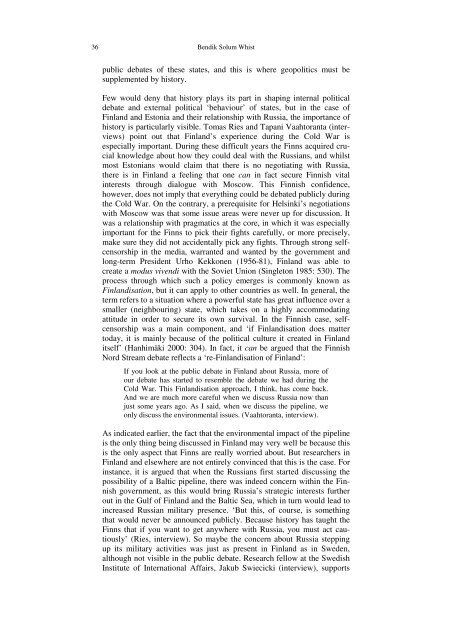Nord Stream: Not Just a Pipeline
Nord Stream: Not Just a Pipeline
Nord Stream: Not Just a Pipeline
Create successful ePaper yourself
Turn your PDF publications into a flip-book with our unique Google optimized e-Paper software.
36 Bendik Solum Whist<br />
public debates of these states, and this is where geopolitics must be<br />
supplemented by history.<br />
Few would deny that history plays its part in shaping internal political<br />
debate and external political ‘behaviour’ of states, but in the case of<br />
Finland and Estonia and their relationship with Russia, the importance of<br />
history is particularly visible. Tomas Ries and Tapani Vaahtoranta (interviews)<br />
point out that Finland’s experience during the Cold War is<br />
especially important. During these difficult years the Finns acquired crucial<br />
knowledge about how they could deal with the Russians, and whilst<br />
most Estonians would claim that there is no negotiating with Russia,<br />
there is in Finland a feeling that one can in fact secure Finnish vital<br />
interests through dialogue with Moscow. This Finnish confidence,<br />
however, does not imply that everything could be debated publicly during<br />
the Cold War. On the contrary, a prerequisite for Helsinki’s negotiations<br />
with Moscow was that some issue areas were never up for discussion. It<br />
was a relationship with pragmatics at the core, in which it was especially<br />
important for the Finns to pick their fights carefully, or more precisely,<br />
make sure they did not accidentally pick any fights. Through strong selfcensorship<br />
in the media, warranted and wanted by the government and<br />
long-term President Urho Kekkonen (1956-81), Finland was able to<br />
create a modus vivendi with the Soviet Union (Singleton 1985: 530). The<br />
process through which such a policy emerges is commonly known as<br />
Finlandisation, but it can apply to other countries as well. In general, the<br />
term refers to a situation where a powerful state has great influence over a<br />
smaller (neighbouring) state, which takes on a highly accommodating<br />
attitude in order to secure its own survival. In the Finnish case, selfcensorship<br />
was a main component, and ‘if Finlandisation does matter<br />
today, it is mainly because of the political culture it created in Finland<br />
itself’ (Hanhimäki 2000: 304). In fact, it can be argued that the Finnish<br />
<strong>Nord</strong> <strong>Stream</strong> debate reflects a ‘re-Finlandisation of Finland’:<br />
If you look at the public debate in Finland about Russia, more of<br />
our debate has started to resemble the debate we had during the<br />
Cold War. This Finlandisation approach, I think, has come back.<br />
And we are much more careful when we discuss Russia now than<br />
just some years ago. As I said, when we discuss the pipeline, we<br />
only discuss the environmental issues. (Vaahtoranta, interview).<br />
As indicated earlier, the fact that the environmental impact of the pipeline<br />
is the only thing being discussed in Finland may very well be because this<br />
is the only aspect that Finns are really worried about. But researchers in<br />
Finland and elsewhere are not entirely convinced that this is the case. For<br />
instance, it is argued that when the Russians first started discussing the<br />
possibility of a Baltic pipeline, there was indeed concern within the Finnish<br />
government, as this would bring Russia’s strategic interests further<br />
out in the Gulf of Finland and the Baltic Sea, which in turn would lead to<br />
increased Russian military presence. ‘But this, of course, is something<br />
that would never be announced publicly. Because history has taught the<br />
Finns that if you want to get anywhere with Russia, you must act cautiously’<br />
(Ries, interview). So maybe the concern about Russia stepping<br />
up its military activities was just as present in Finland as in Sweden,<br />
although not visible in the public debate. Research fellow at the Swedish<br />
Institute of International Affairs, Jakub Swiecicki (interview), supports













